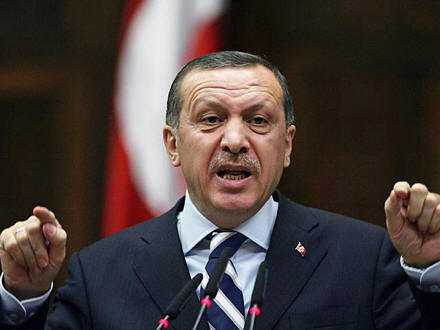
Tue, September 14, 2010 Tishrei 6, 5771
This is the fourth time Turkish Prime Minister Recep Tayyip Erdogan has savored victory in a national ballot. Twice he won general elections, twice in referenda. He is a perennial ‘winner,’ even if we in Israel are largely united in our distaste for him.
By Alon Liel
This is the fourth time Turkish Prime Minister Recep Tayyip Erdogan has savored victory in a national ballot. Twice he won general elections, twice in referenda. He is a perennial “winner,” even if we in Israel are largely united in our distaste for him.
Yesterday, voters overwhelmingly approved the referendum initiated by Erdogan’s Islamic-oriented Justice and Development Party. The constitutional measures passed give the government wide-ranging power to exert control over the military and judiciary, both traditional bulwarks of the country’s secularism.
| Turkey’s Prime Minister Recep Tayyip Erdogan speaks during a press conference at the international airport in Santiago, Monday May 31, 2010. | |
| Photo by: AP |
The referendum result is a triumph for Erdogan’s ideology. It’s hard to imagine the heads of Turkey’s army plotting another coup, given that the reforms now allow them to be tried in civilian court, or the country’s high court banning certain political parties as it has in the past.
Erdogan can now look both forward and back with satisfaction. He has made his country richer, more stable and stronger in the international community, while simultaneously making it both more democratic and more devout.
Should Erdogan prevail in the July 2011 election – a legitimate prospect after yesterday’s victory – he will become the longest-serving, and most influential, Turkish leader since Kemal Ataturk.
The reforms passed yesterday overturn eight decades of government-touted secular ideology, instilling instead a new political creed that could rightfully be termed Erdoganism. And a leader doesn’t have an “ism” attached to his name simply by toeing his predecessors’ line.
Many in Turkey and abroad view Turkey’s transformation – more religious, more eastward-looking – as cause for concern. But to the majority of Turks, the reforms have made the republic more democratic, more humane.
Erdogan will remain hated by the Turkish secular elite, which is concentrated in the army, universities and business community. But he is beloved by Turkey’s poorer, devout periphery. The prime minister has straightened the backbone of the marginalized, and in return has received their undying loyalty.
Fears that Erdogan will turn the country into an Iranian-style Islamic republic are unfounded. Support for the prime minister rests not only on ideology but also on modernization and the prosperity he has helped bring.
We in Israel know Erdogan primarily for his hard-line Mideast policy, less so for his economic platform. But the prime minister’s every step is taken with fiscal growth in mind. Erdogan will abandon neither modernization nor democracy, the system allowing his government to stay in power.
The prime minister must now meet one major objective to justify the “ism” that has been appended to his name: Create a Kurdish state, or at least recognize Turkey’s Kurds as a national minority.
Erdogan is ripe for it, but his country is not. He needs one more term to complete his Kurdish mission. Should he win next July, that may be a real possibility.